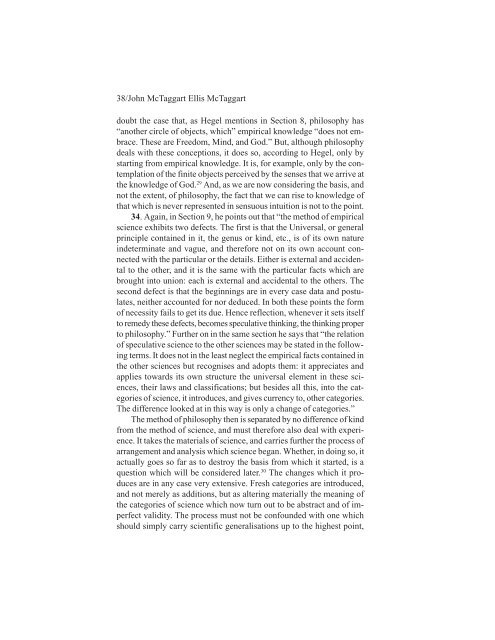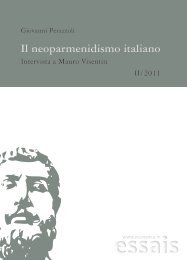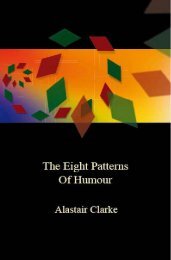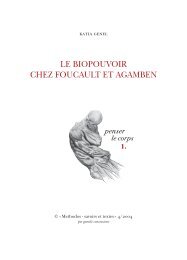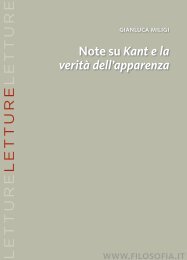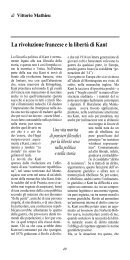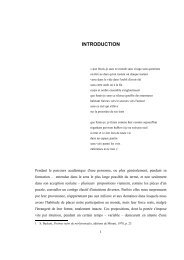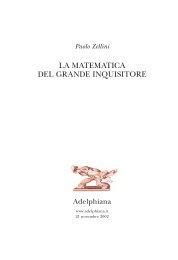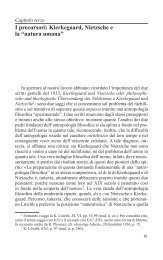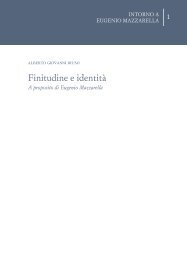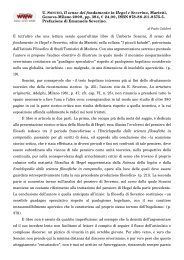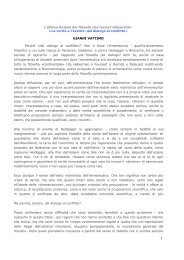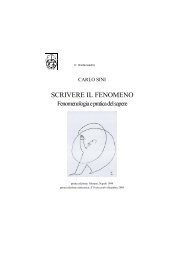McTaggart, Studies in the Hegelian Dialectic
McTaggart, Studies in the Hegelian Dialectic
McTaggart, Studies in the Hegelian Dialectic
Create successful ePaper yourself
Turn your PDF publications into a flip-book with our unique Google optimized e-Paper software.
38/John <strong>McTaggart</strong> Ellis <strong>McTaggart</strong><br />
doubt <strong>the</strong> case that, as Hegel mentions <strong>in</strong> Section 8, philosophy has<br />
“ano<strong>the</strong>r circle of objects, which” empirical knowledge “does not embrace.<br />
These are Freedom, M<strong>in</strong>d, and God.” But, although philosophy<br />
deals with <strong>the</strong>se conceptions, it does so, accord<strong>in</strong>g to Hegel, only by<br />
start<strong>in</strong>g from empirical knowledge. It is, for example, only by <strong>the</strong> contemplation<br />
of <strong>the</strong> f<strong>in</strong>ite objects perceived by <strong>the</strong> senses that we arrive at<br />
<strong>the</strong> knowledge of God. 29 And, as we are now consider<strong>in</strong>g <strong>the</strong> basis, and<br />
not <strong>the</strong> extent, of philosophy, <strong>the</strong> fact that we can rise to knowledge of<br />
that which is never represented <strong>in</strong> sensuous <strong>in</strong>tuition is not to <strong>the</strong> po<strong>in</strong>t.<br />
34. Aga<strong>in</strong>, <strong>in</strong> Section 9, he po<strong>in</strong>ts out that “<strong>the</strong> method of empirical<br />
science exhibits two defects. The first is that <strong>the</strong> Universal, or general<br />
pr<strong>in</strong>ciple conta<strong>in</strong>ed <strong>in</strong> it, <strong>the</strong> genus or k<strong>in</strong>d, etc., is of its own nature<br />
<strong>in</strong>determ<strong>in</strong>ate and vague, and <strong>the</strong>refore not on its own account connected<br />
with <strong>the</strong> particular or <strong>the</strong> details. Ei<strong>the</strong>r is external and accidental<br />
to <strong>the</strong> o<strong>the</strong>r, and it is <strong>the</strong> same with <strong>the</strong> particular facts which are<br />
brought <strong>in</strong>to union: each is external and accidental to <strong>the</strong> o<strong>the</strong>rs. The<br />
second defect is that <strong>the</strong> beg<strong>in</strong>n<strong>in</strong>gs are <strong>in</strong> every case data and postulates,<br />
nei<strong>the</strong>r accounted for nor deduced. In both <strong>the</strong>se po<strong>in</strong>ts <strong>the</strong> form<br />
of necessity fails to get its due. Hence reflection, whenever it sets itself<br />
to remedy <strong>the</strong>se defects, becomes speculative th<strong>in</strong>k<strong>in</strong>g, <strong>the</strong> th<strong>in</strong>k<strong>in</strong>g proper<br />
to philosophy.” Fur<strong>the</strong>r on <strong>in</strong> <strong>the</strong> same section he says that “<strong>the</strong> relation<br />
of speculative science to <strong>the</strong> o<strong>the</strong>r sciences may be stated <strong>in</strong> <strong>the</strong> follow<strong>in</strong>g<br />
terms. It does not <strong>in</strong> <strong>the</strong> least neglect <strong>the</strong> empirical facts conta<strong>in</strong>ed <strong>in</strong><br />
<strong>the</strong> o<strong>the</strong>r sciences but recognises and adopts <strong>the</strong>m: it appreciates and<br />
applies towards its own structure <strong>the</strong> universal element <strong>in</strong> <strong>the</strong>se sciences,<br />
<strong>the</strong>ir laws and classifications; but besides all this, <strong>in</strong>to <strong>the</strong> categories<br />
of science, it <strong>in</strong>troduces, and gives currency to, o<strong>the</strong>r categories.<br />
The difference looked at <strong>in</strong> this way is only a change of categories.”<br />
The method of philosophy <strong>the</strong>n is separated by no difference of k<strong>in</strong>d<br />
from <strong>the</strong> method of science, and must <strong>the</strong>refore also deal with experience.<br />
It takes <strong>the</strong> materials of science, and carries fur<strong>the</strong>r <strong>the</strong> process of<br />
arrangement and analysis which science began. Whe<strong>the</strong>r, <strong>in</strong> do<strong>in</strong>g so, it<br />
actually goes so far as to destroy <strong>the</strong> basis from which it started, is a<br />
question which will be considered later. 30 The changes which it produces<br />
are <strong>in</strong> any case very extensive. Fresh categories are <strong>in</strong>troduced,<br />
and not merely as additions, but as alter<strong>in</strong>g materially <strong>the</strong> mean<strong>in</strong>g of<br />
<strong>the</strong> categories of science which now turn out to be abstract and of imperfect<br />
validity. The process must not be confounded with one which<br />
should simply carry scientific generalisations up to <strong>the</strong> highest po<strong>in</strong>t,


